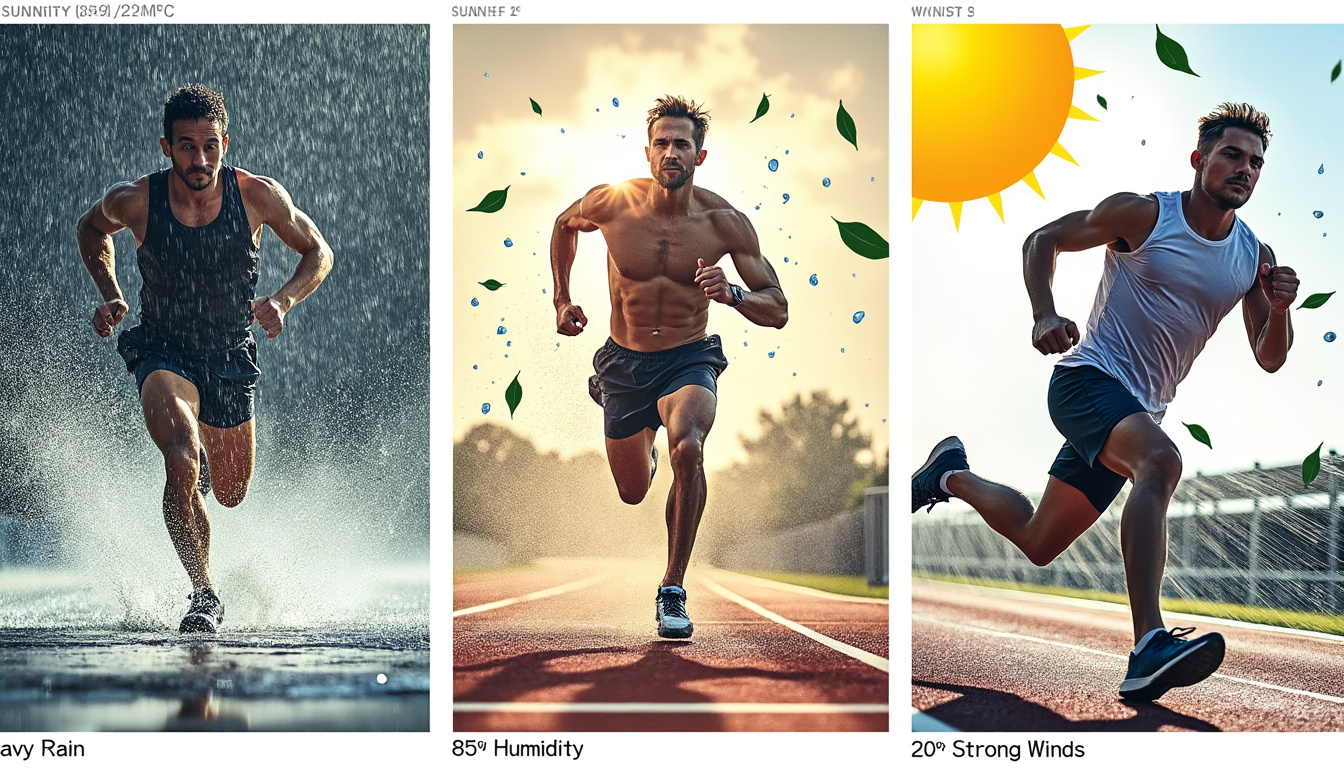Understanding the intricate relationship between weather and running performance is essential for every athlete, whether you’re training for a marathon or simply enjoying outdoor runs. Various weather influences, such as temperature, humidity, and wind speed, can significantly impact your performance. This article dives deep into how these elements affect your running experience, offering insights and strategies to optimize your runs under varying conditions.
From the science behind the so-called “perfect running temperature” to practical tips for tackling extreme conditions, this guide equips you with the information necessary to adapt your running routine regardless of the weather. So lace up your Nike or Adidas sneakers, and let’s explore the impact of weather on your running performance!
What to eat: Nutritional tips for the Sydney marathon
The perfect running temperature: what science says
Research indicates that the ideal temperature for optimal running performance falls between 50°F and 54°F (approximately 10°C – 12°C). Studies show that most runners begin to experience a slowdown in their performance once temperatures surpass 55°F. In fact, temperatures above 65°F can be detrimental during races, leading to what many athletes describe as “hitting the wall.” 🍃✨
The physiological effects of temperature on runners
When temperatures rise, the human body must work harder to maintain a stable internal temperature. Here are some effects of high temperatures on your running:
- 💧 Increased sweating: As temperatures rise, your body produces more sweat to cool down. This process consumes energy, leading to quicker fatigue.
- 🧊 Fluid and electrolyte loss: More sweating means you must replenish lost fluids and electrolytes to maintain performance and prevent dehydration.
- 👟 Foot discomfort: Higher temperatures can cause your feet to perspire more, potentially leading to blisters and general discomfort during your run.
For those residing in warmer regions, like Texas, it can be particularly crucial to adjust your running schedule, opting for cooler morning or evening hours for your workouts. Running during those times not only helps mitigate the heat but also optimizes your performance outcomes. 🔥🌅
The impact of humidity and wind on running performance
While temperature plays a significant role, humidity and wind speed are other vital weather parameters that impact running performance. Humidity levels influence bodily processes and can even lead to heat stress during long-distance events.
Dealing with high humidity
High humidity can make even moderate temperatures feel oppressive. Here’s how humidity affects your runs:
- 💨 Reduced sweat evaporation: When the air is saturated with moisture, your sweat doesn’t evaporate effectively, which hampers your body’s ability to cool down.
- 🌡️ Increased perceived exertion: You might find that racing or running feels much tougher due to external humidity levels, something that can impact your pace significantly.
- 💪 Higher risk for heat-related illnesses: High humidity increases your risk of experiencing heat exhaustion or heat stroke, underscoring the need for hydration strategies.
Understanding the wind’s role in running performance
Wind speed can have various effects on your run. A gentle breeze can feel refreshing during a workout, while strong headwinds may hinder your pace. Here’s how wind factor affects runners:
- 🌬️ Cooling effect: Light wind can help cool you down, thereby enhancing your performance. On the other hand, high winds can create added resistance, slowing you down.
- 🏃♂️ Psychological challenges: Running against strong winds can mentally discourage runners, leading to decreased motivation or performance.
- 🥇 Tactical considerations during races: Understanding wind patterns can be beneficial for race strategies, including drafting behind other runners to cope with headwinds.
The influence of rain on your running experience
Many runners have differing opinions when it comes to running in the rain. Light rain can be refreshing, while heavy downpours can lead to discomfort and potential injuries:
How rain affects running performance
The impact of rain on your performance depends on its intensity:
- ☔ Light drizzle: In moderate rain, the cooling effect can provide relief and even enhance your performance, allowing for an invigorating run.
- 💧 Heavy rain: When it pours, however, visibility gets decreased, leading to cautious running to prevent slips and falls. Heavy rain increases the risk of blisters from wet clothing and shoes, affecting your comfort level.
- 🩹 Common blister zones: Check areas like your feet and thighs for potential blistering, especially during wet runs.
Strategies for optimizing performance in varied weather conditions
Even if the weather is not ideal, there are several strategies you can employ to ensure your running experience remains positive:
- 🕒 Plan ahead: Anticipate possible weather changes and choose your running time accordingly. Look at forecasts and choose the least taxing option for your performance.
- 💧 Stay hydrated: Regardless of temperature, keep your water levels in check—hydrate before, during, and after your runs. Consider high-electrolyte drinks for longer runs.
- 👚 Dress appropriately: Wear moisture-wicking fabrics to keep dry during humid weather or specialized gear to shield against the rain. Brands like Brooks, Asics, and Salomon provide great options!
- 🚀 Adjust your pace: Don’t be afraid to modify your pace given the conditions, especially in extreme temperatures or humidity. A manageable pace yields better long-term outcomes.
Maximizing your running performance
Ultimately, understanding the effects of weather can allow you to adapt your training and performance strategies, providing insights into how you can push your limits. By tuning in to the factors at play, you’ll be better equipped to tackle any run that comes your way. Embrace every weather condition as an opportunity for improvement and growth. 🌈🏃♀️







